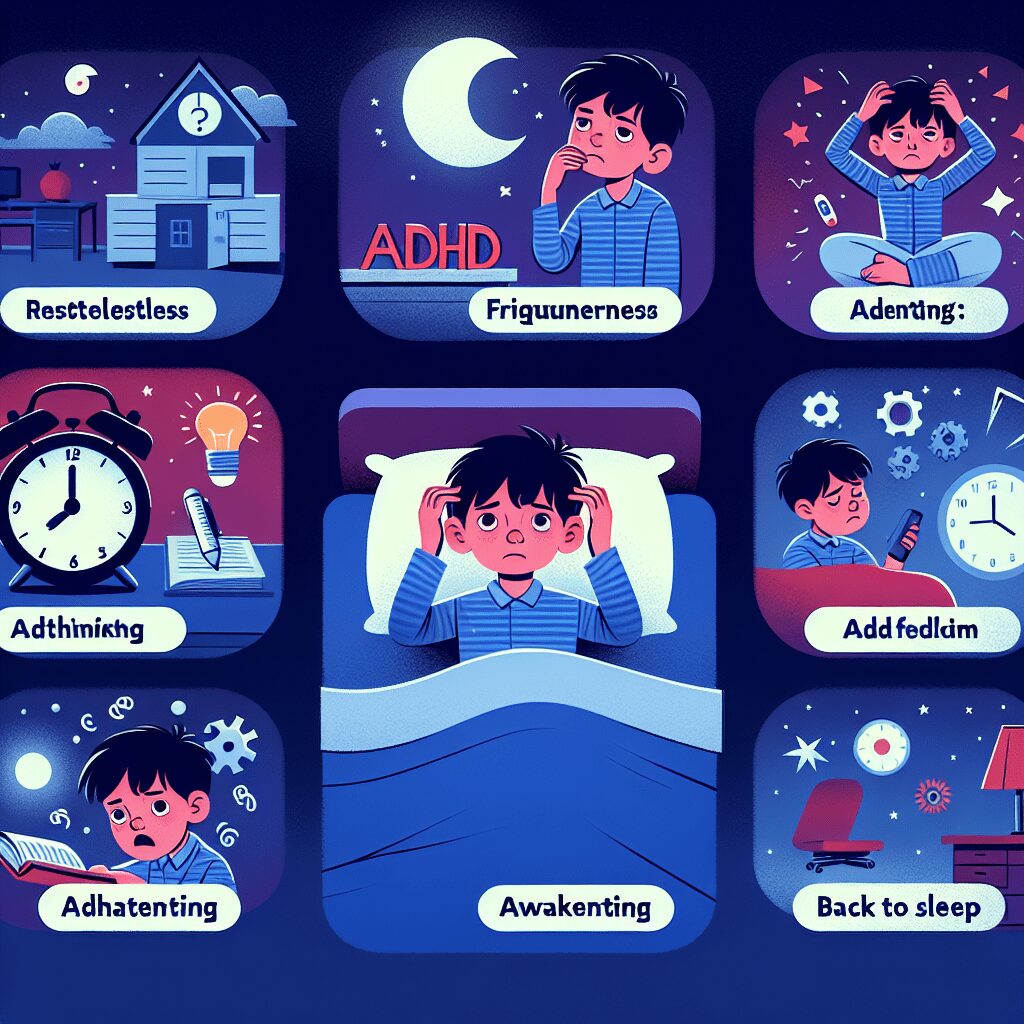The Sleep Struggle: Understanding ADHD’s Impact on Your Child’s Rest
Sleep difficulties are common for children with Attention Deficit Hyperactivity Disorder (ADHD). The interplay between ADHD symptoms and sleep can create a challenging environment for both parents and children. Understanding this dynamic is crucial in establishing better sleep habits and nurturing overall well-being. With practical strategies and insights, you can help your child find rest and peace at night.
Features of ADHD and Sleep Challenges
Children with ADHD often experience symptoms that disrupt their sleep. These features include hyperactivity, impulsivity, and inattention, making it more challenging for them to settle down at night. Impulsivity can lead to restlessness, causing them to feel the urge to move or engage in stimulating activities when they should be unwinding. Hyperactivity can result in an increased sense of energy during bedtime, while inattentiveness might make it hard for them to remember calming rituals that promote sleep.
Behavioral issues can heighten stress for both children and parents, leading to anxiety over bedtime routines. Children with ADHD may also have co-occurring conditions, such as anxiety or autism spectrum disorder, further complicating sleep. Each factor adds complexity to the sleep struggle, making it critical for families to seek tailored solutions to navigate these obstacles.
Overview of ADHD and Its Impact on Sleep
ADHD affects approximately 5-10% of children worldwide. The condition alters the brain’s ability to regulate attention and behavior, and this dysfunction often extends to the sleep-wake cycle. Many children with ADHD have difficulty falling asleep, experience frequent awakenings during the night, and struggle to rise in the morning. This inadequate rest affects their behavior, mood, and overall functioning during the day.
Poor sleep can intensify ADHD symptoms, creating a feedback loop that exacerbates the situation. The more tired a child feels, the harder it may be for them to focus at school or control impulses. Understanding this connection is vital for parents, as it helps illuminate the importance of prioritizing healthy sleep habits.
Why Does ADHD Affect Sleep?
The reasons for sleep difficulties in children with ADHD are multifaceted. First, neural mechanisms that regulate sleep may be impaired. The brain’s ability to transition to sleep can be sluggish, impacting how quickly a child falls asleep. Additionally, melatonin production—the hormone responsible for regulating sleep cycles—may be delayed in children with ADHD, causing sleep onset to become more challenging.
Environmental factors also play a role. A stimulating bedroom filled with electronic devices can keep a child engaged when they should be winding down. Disruptions in routine, common in households with ADHD children, can make bedtime chaotic and unpredictable. Recognizing these factors is essential in creating a conducive sleep environment for your child.
Who Experiences Sleep Struggles Due to ADHD?
The sleep struggles related to ADHD influence a wide range of children. While the presence of ADHD is a primary factor, various age groups and personalities may exhibit different sleep behaviors. For instance, younger children might experience more pronounced bedtime resistance due to their difficulty understanding the connection between sleep and health.
On the other hand, older children and teenagers may engage in avoidance strategies such as screen time, further complicating their sleep routine. Each child’s individual experience shapes how ADHD manifests during sleep, requiring a customized approach from parents.
Who Will Use the Insights from This Article?
Parents, caregivers, and educators will find this article valuable, as it addresses the challenges of ADHD-related sleep issues. By gaining insights into the nature of the struggle, caregivers can develop a better understanding of their children’s needs. This knowledge empowers them to implement changes that positively impact sleep quality, benefiting the child’s emotional and academic performance.
With strategies that promote healthier sleep habits, parents can become advocates for better rest, ensuring their children receive adequate, restorative sleep.
What Are Effective Strategies for Managing Sleep with ADHD?
Creating a calming bedtime routine can dramatically improve your child’s sleep. Here are ten strategies to consider:
- Establish a Consistent Bedtime: Develop a regular sleep schedule that allows for a wind-down period each night.
- Create a Soothing Environment: Ensure the bedroom is quiet, dark, and cool to promote relaxation.
- Limit Screen Time: Encourage devices to be turned off at least an hour before bedtime, as screens can disrupt melatonin production.
- Use Relaxation Techniques: Introduce deep breathing exercises or gentle yoga to help calm the mind and body before bed.
- Engage in Calming Activities: Read books or listen to soft music to transition into sleep mode.
- Monitor Meal and Snack Times: Avoid heavy meals and sugary snacks close to bedtime, as they can interfere with sleep quality.
- Encourage Physical Activity: Regular exercise during the day can help expend energy, making it easier for your child to fall asleep at night.
- Implement a Sleep Diary: Track sleep patterns and note any factors that may influence sleep quality.
- Seek Professional Guidance: Consult a sleep specialist or pediatrician if persistent sleep issues arise.
- Be Patient and Encouraging: Celebrate small successes and reassure your child throughout the process.
Pros and Cons of Different Approaches
When considering various methods to improve sleep for children with ADHD, it’s helpful to evaluate the pros and cons of each approach. For instance:
Bedtime Routines:
- Pros: Provides consistency, can help signal to the child that it’s time for sleep.
- Cons: Requires commitment from parents to maintain the routine.
Limiting Stimulants:
- Pros: Reduces interference with the body’s natural sleep cycle.
- Cons: May lead to resistance or frustration if a child feels restricted.
Seeking Professional Help:
- Pros: Access to expert advice tailored to your child’s unique needs.
- Cons: Can lead to additional costs and time commitments for families.
Similar Products to Enhance Sleep for ADHD Children
Several products can support children with ADHD in achieving better sleep. Here are a few recommendations:
- Weighted Blankets: These can provide a soothing effect, helping children feel more grounded.
- White Noise Machines: These create a calming atmosphere, masking disruptive sounds that might interfere with sleep.
- Sleep Masks: Using sleep masks can block light, helping kids relax in darker settings.
- Relaxation Apps: Consider apps that offer guided meditations or sleep stories designed for children.
- Essential Oil Diffusers: Scents like lavender can promote relaxation and improve sleep quality.
- Sleep Journals: Teaching kids to track their feelings around sleep can promote self-awareness and better patterns.
- Books on Relaxation: Storybooks that focus on relaxation can build positive associations with winding down at night.
- Calm Down Kits: Include items such as stress balls, fidget toys, or calming visuals to help children manage anxiety around sleep.
- Gradual Light Alarm Clocks: These can simulate natural morning light, fostering a more positive waking experience.
- Breathing Exercises Guide: A simple guide on how to practice calming breathing techniques can be very useful.
Opinions, Examples, Comparisons
The experiences of parents navigating sleep struggles with ADHD vary. Some families find success using technology, such as sleep apps, while others achieve better results through traditional methods like reading bedtime stories. What works can differ between children; therefore, flexibility is key.
Listening to other parents’ shared experiences can provide insights and innovative strategies. Forums, support groups, or online communities can serve as excellent resources for discussing challenges and sharing their triumphs. By exchanging ideas, families often discover actionable solutions that resonate.
FAQs
1. What can parents do if their child refuses to go to bed?
Set a daily routine with consistent bedtime and calming activities that signal it’s time to unwind.
2. How much sleep do children with ADHD need?
Most children aged 6-12 should get between 9-12 hours of sleep each night to optimize functioning.
3. Do sleep medications help children with ADHD?
Consulting a healthcare professional is vital. Medications may assist some children but can have side effects.
4. Can improving sleep help ADHD symptoms?
Better sleep can reduce impulsivity and inattention, improving overall behavior and mood for children with ADHD.
5. Are there foods that promote sleep?
Foods high in tryptophan, such as turkey and bananas, can promote sleepiness. Avoiding sugar and caffeine close to bedtime is crucial.
Disclaimer: As an Amazon Associate, I earn from qualifying purchases. I may earn a commission from qualifying purchases as an affiliate. Please note that I only recommend products I believe will provide value to my readers.









